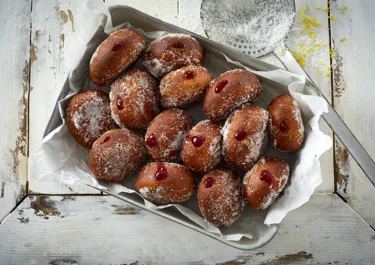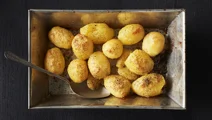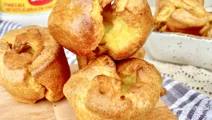
Krapfen

Instructions
FAQ: Questions about krapfen
We have answered the most common questions to help you create these tasty German jelly doughnuts. Keep on reading to learn more!
Ingredients
| 300 ml | |
|
Sugar + extra for rolling
|
100 g |
|
Butter
|
100 g |
|
Vanilla pod (seeds) or an equivalent amount of vanilla paste
|
1 |
|
Lemon zest, grated (unsprayed)
|
1 tbsp |
|
Coarse salt
|
1 tsp |
|
Yeast
|
25 g |
|
Eggs
|
2 |
|
Wheat flour
|
650 g |
|
Wheat flour for rolling out
|
25 g |
|
Frying oil or rapeseed oil
|
1 l |
|
Raspberry jam
|
150 g |
Tips: Get the best batch of krapfen
Take a look at our tips to refine your krapfen-making skills. These will help you achieve impeccable taste and a flawless finish that is sure to impress.
Choosing the right yeast
To ensure your krapfen rises beautifully and tastes great, select the appropriate yeast. Fresh yeast helps the dough rise quickly and imparts a strong yeast flavour, which adds authenticity to these beauties. If you cannot find fresh yeast, instant yeast is a good substitute that is easy to use and provides a milder flavour.
Keep a steady oil temperature
Keep the oil temperature steady at 170–175 °C. A candy thermometer will help you monitor the heat accurately. When you add the krapfen to the oil, the temperature may drop, so avoid putting too many in at once and slightly increase the heat to compensate. This helps you avoid soggy or undercooked pastries. Fry each side for 2–3 minutes until they have a lovely golden colour.
Proper storage
For the krapfen to remain delicious, store any leftovers in a tight-sealing container at room temperature. If you need to keep them for longer than a day, skip adding sugar and put them in the freezer. When ready to eat them again, warm them in the oven. This will bring back their cosy warmth and soft texture, making them just as tempting as when they were fresh.
Try our recipe for homemade krapfen
Our recipe for krapfen offers a sweet treat that can be enjoyed at any time of day. Serve them as a delightful breakfast pastry or a scrumptious dessert; these light, fluffy doughnuts filled with sweet jam bring the warmth and comfort of home baking right to your kitchen. Enjoy them fresh out of the fryer or later in the day to satisfy your sweet tooth.
Are you looking for more sweet recipes? You have come to the right place! We have a large collection of delicious treats, sweets, and desserts for you to prepare and serve to family and friends. Try our recipe for pancakes with apples, a stunning rainbow cake, and small éclairs.
Light and fluffy fried dough
The secret to perfect krapfen lies in the texture of the dough. They must be airy and light but slightly chewy. When fried, their exterior turns perfectly golden and gets a delicate crispness that contrasts wonderfully with its soft, pillowy inside. The dough is kneaded carefully, allowing it to rise and develop a tender crumb. While sweet, the dough has hints of vanilla and lemon, making the krapfen all the more delicious.
Sweet and tart raspberry jam filling
Biting into a krapfen, you experience the crisp yet tender dough followed by a delightful burst of raspberry jam that cascades over your taste buds. This jam introduces a luscious, creamy centre, mingling sweet and bright flavours with rich, fried pastry. The tartness of the berries effectively balances the richness, ensuring the krapfen remains delightfully sweet without becoming overwhelming.
Enjoy a Berliner — authentic German doughnuts
Krapfen, also known as German jelly doughnuts, have a rich history dating back to the 16th century. Originally, due to the high cost of sugar, these doughnuts were filled with cheese or meat. However, as sugar became more affordable, sweet fruit preserves became the popular choice for filling. The first record of a jelly-filled doughnut, referred to as “Gefüllte Krapfen,” appears in a German cookbook from 1485. The term “Berliner” originated in the 1800s, following a tale about a baker from Berlin who crafted doughnuts for the Prussian Army. The soldiers affectionately named the pastry after his city. Today, krapfen is enjoyed as a festive treat, embodying a longstanding culinary tradition in Germany and Austria.
Experiment with different fillings and flavours
Raspberry jam is a traditional filling for krapfen, but there are many other flavours to explore. For an authentic experience, try apricot jam, or opt for chocolate hazelnut cream for a decadent twist. Vanilla custard provides a creamy alternative, while Nutella and salt caramel delivers a delightful surprise. Feel free to get creative and choose fillings that you love. Beyond the classic dusting of sugar, consider luxurious toppings like chocolate ganache to elevate your krapfen.











